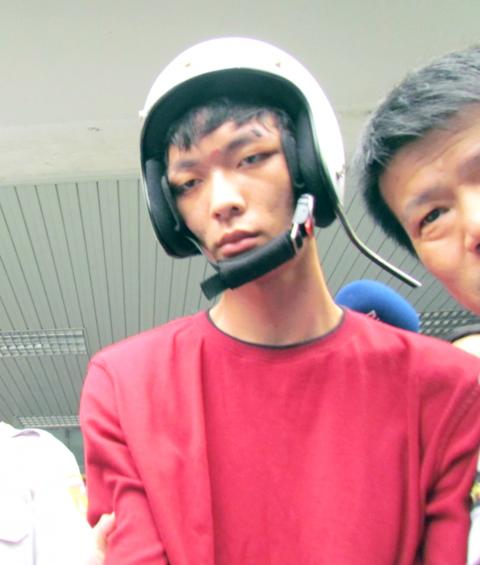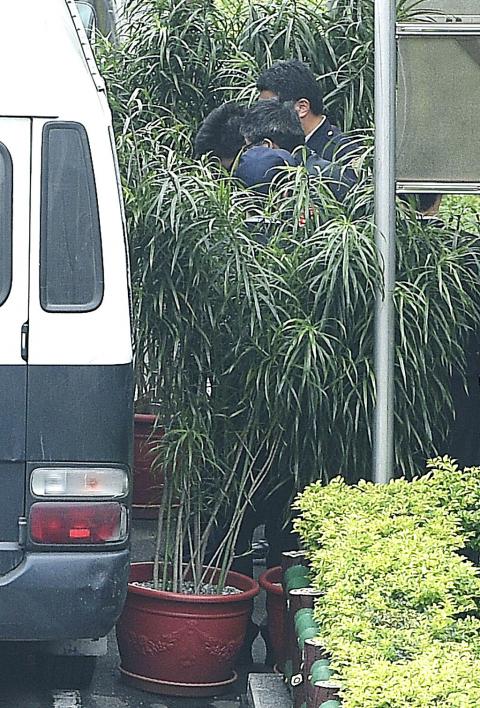The New Taipei City District Court collegiate bench yesterday found MRT killer Cheng Chieh (鄭捷) guilty on four counts of murder and 22 counts of attempted manslaughter, handing down four death sentences and prison sentences ranging from five to eight years, amounting to a total jail term of 144 years.
Cheng’s citizen’s rights have also been revoked for life.
The ruling may be appealed, the court said.

Photo: CNA
Cheng, then a student of Tunghai University, attacked passengers on Taipei’s MRT metro rail system on May 21 last year on the Bannan Line between Longshan Temple Station and Jiangzicui Station. He killed Hsieh Ching-yun (解青雲), Chang Cheng-han (張正翰), Lee Tsui-yun (李翠雲) and Pan Pi-chu (潘碧珠), and injured 22 others.
Cheng had initially said that he was tired of life, but was afraid of committing suicide, so he committed multiple counts of murder so that he would be assured of capital punishment.
The court found that Cheng did not exhibit signs of psychotic abnormalities or mental deficiencies at the time of his actions.

Photo: Chen Chih-chu, Taipei Times
Central Police University professor Shen Sheng-ang (沈勝昂) said the possibility of Cheng being rehabilitated was unlikely, adding that “Cheng’s situation is akin to that of a terminal-stage cancer patient.”
Cheng’s initial aloofness and silence, as well as his failure to apologize to the victims’ families, saw an abrupt turn on Feb. 10, when he broke his silence to say he would undergo psychiatric consultation and would not resort to violence and murder again if given the chance for parole.
According to sources, Cheng’s sudden change in attitude was due to his belief that he could accept a life sentence and perhaps make a living by starting a small business if he were to be released on parole.
One source quoted Cheng saying to his friends that “[If I] win [the case], we’ll have the chance of living our lives as we like; [if I] lose, we’ll meet in another life as heroes.”
Cheng’s lawyers sought to rationalize his attitude after the killings by saying that his thinking was like that of a teenager, believing that if he showed any regret, he would lose face.
That is why he seemed aloof, although he knew what he did was wrong, they said.
“We understand that the court is under great pressure from the media, but trying to demonize the defendant will not help society,” Cheng’s lawyers said in a statement.
His lawyers also criticized the presiding judges, saying that the court violated their client’s rights by forcing him to attend court to hear the ruling, as he was not by law mandated to be present.
“By forcing our client to appear at court simply for maximum media effect, the judges have lost focus and have endangered the equality and uniformity of the law, creating an exception that might be followed in future cases,” the lawyers said.
Meanwhile, family members of the victims said that the ruling was in accordance with the public’s expectations, but they could not condone the comments from Cheng’s lawyers.
Lee’s brother Lee Jui-chang (李瑞昌) said he was glad the New Taipei City District Court judges were just, and that he hoped judges in the appellate courts would continue to uphold the ruling.
The reasons cited by the lawyers for the murders sought to deny Cheng’s responsibility in the matter, Lee Jui-chang said, adding that he hoped the day for the final ruling on Cheng’s capital punishment could be expedited.
Additional reporting by CNA

MAKING WAVES: China’s maritime militia could become a nontraditional threat in war, clogging up shipping lanes to prevent US or Japanese intervention, a report said About 1,900 Chinese ships flying flags of convenience and fishing vessels that participated in China’s military exercises around Taiwan last month and in January last year have been listed for monitoring, Coast Guard Administration (CGA) Deputy Director-General Hsieh Ching-chin (謝慶欽) said yesterday. Following amendments to the Commercial Port Act (商港法) and the Law of Ships (船舶法) last month, the CGA can designate possible berthing areas or deny ports of call for vessels suspected of loitering around areas where undersea cables can be accessed, Oceans Affairs Council Minister Kuan Bi-ling (管碧玲) said. The list of suspected ships, originally 300, had risen to about

DAREDEVIL: Honnold said it had always been a dream of his to climb Taipei 101, while a Netflix producer said the skyscraper was ‘a real icon of this country’ US climber Alex Honnold yesterday took on Taiwan’s tallest building, becoming the first person to scale Taipei 101 without a rope, harness or safety net. Hundreds of spectators gathered at the base of the 101-story skyscraper to watch Honnold, 40, embark on his daredevil feat, which was also broadcast live on Netflix. Dressed in a red T-shirt and yellow custom-made climbing shoes, Honnold swiftly moved up the southeast face of the glass and steel building. At one point, he stepped onto a platform midway up to wave down at fans and onlookers who were taking photos. People watching from inside

Japan’s strategic alliance with the US would collapse if Tokyo were to turn away from a conflict in Taiwan, Japanese Prime Minister Sanae Takaichi said yesterday, but distanced herself from previous comments that suggested a possible military response in such an event. Takaichi expressed her latest views on a nationally broadcast TV program late on Monday, where an opposition party leader criticized her for igniting tensions with China with the earlier remarks. Ties between Japan and China have sunk to the worst level in years after Takaichi said in November that a hypothetical Chinese attack on Taiwan could bring about a Japanese

The WHO ignored early COVID-19 warnings from Taiwan, US Deputy Secretary of Health and Human Services Jim O’Neill said on Friday, as part of justification for Washington withdrawing from the global health body. US Secretary of State Marco Rubio on Thursday said that the US was pulling out of the UN agency, as it failed to fulfill its responsibilities during the COVID-19 pandemic. The WHO “ignored early COVID warnings from Taiwan in 2019 by pretending Taiwan did not exist, O’Neill wrote on X on Friday, Taiwan time. “It ignored rigorous science and promoted lockdowns.” The US will “continue international coordination on infectious